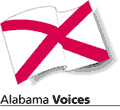ALABAMA VOICES
Tax plan will force timberland owners to sell
By John McMillan
 Ray Jenkins, a former editor at the
Advertiser who later was President Jimmy Carter's press aide, once said of
editorial writers: "They're the guys who come down out of the hills after the
battle is over and shoot the wounded."
Ray Jenkins, a former editor at the
Advertiser who later was President Jimmy Carter's press aide, once said of
editorial writers: "They're the guys who come down out of the hills after the
battle is over and shoot the wounded."
In the present debate over Gov. Bob Riley's $1.2 billion tax plan, it is obvious the "mainstream media" is supporting the package. But that support is leading to editorializing that borders on shooting the wounded.
In a recent editorial, the Advertiser again took up the chant of "large timber interests" being one of the primary bad guys in Alabama.
To set the record straight on timberland, only 16 percent of Alabama's 23 million forested acres is owned by the forest products industry. Private landowners own 78 percent of Alabama forestland and working families hold most of that land. The remaining 6 percent is owned by governmental entities.
The editorial stated: "Timber and farm interests have had it so good for so long under Alabama's tax system that they rebel at the thought of even modest adjustments in taxation."
That's nonsense. Our association is not against a fair and balanced tax policy. We supported the Torbert Commission Report a few years ago that advocated higher taxes, but spread the misery around so that no one group was singled out.
No matter how you slice it, Amendment One singles out all property owners for a disproportionate hit on taxes. They are hit with the $470 million increase in the Riley plan and will also see an increase of $400 million a year because of annual property reappraisals ordered by the revenue commissioner. This latter increase, once fully implemented, will come about regardless of what happens to Amendment One.
Apparently Amendment One supporters thought it would be good politics to put a 2,000-acre cap on current use valuation for the ownership of land so they could demagogue "large timberland owners and big out of state corporations."
But I have a question for those blindly supporting the pro-tax position. What if someone living in a 2,000-square foot home decided to add an additional 1,000 square feet? Would it be fair to force that person to pay five or six times more in property tax for each square foot over the original 2,000? I don't think so.
There are many Alabamians who own more than 2,000 acres of timberland who are "land poor." They own a lot of land, but are not wealthy. In most cases they simply worked hard and chose to invest in land, as opposed to other types of assets.
The Riley tax plan would tax the land they own above 2,000 acres like prime development land that generates millions of dollars in retail sales. Since a lot of timberland owners see very little income from their land until they harvest timber, sometimes 20 years or more down the road, many of these landowners will have no choice but to sell land to developers.
The recent Southern Forest Resources Assessment study conducted by the U.S Forest Service, the Environmental Protection Agency and other agencies, cited "urban sprawl and development" as the two greatest threats to the forests in the Southeastern United States.
If the desired result of state tax policy is to remove trees and clear land for development, then Amendment One will accomplish that goal.
If, on the other hand, you want to see our forests continue to provide abundant wildlife and outdoor activities and the intangible benefits of clean air and water, you should vote no on Amendment One.
John McMillan is executive vice president of the Alabama Forestry Association.